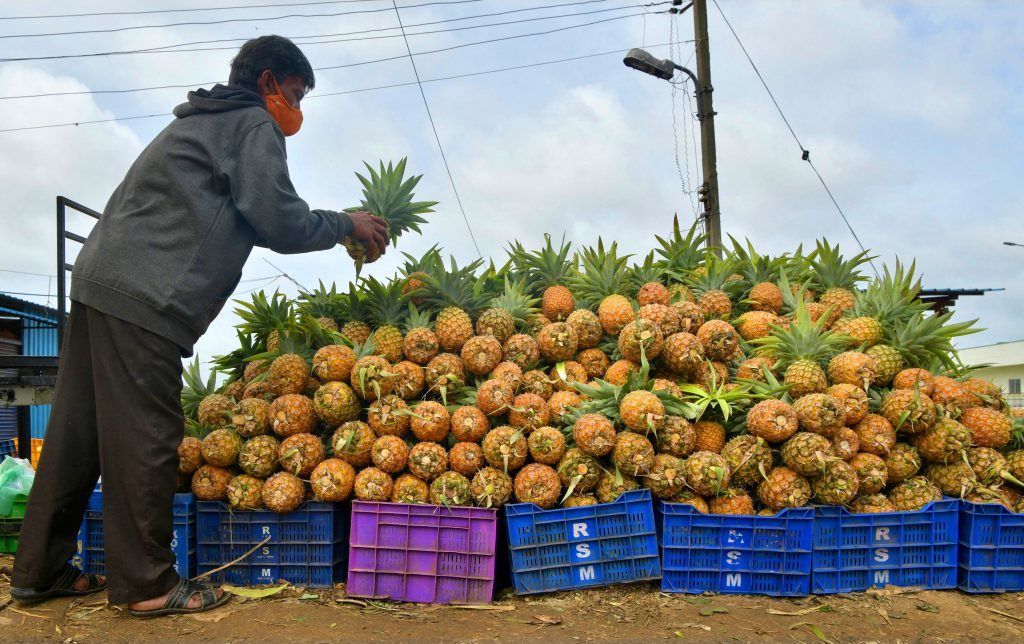Prepare for a whirlwind adventure as we embark on a journey to explore how the delicious and tropical pineapple is referred to in different corners of the world.
From the shores of Hawaii to the vibrant markets of Brazil, join us as we uncover the multi-cultural names for this exotic fruit. Grab your passport and pineapple-themed sunglasses, because this linguistic escapade is about to begin!
What is Pineapple Called in Different Languages?
As we set out on our pineapple expedition, let’s discover how this delectable fruit is referred to across various languages and cultures. You’ll be surprised to find that the word “pineapple” doesn’t quite translate the same way everywhere!
Most countries call pineapple “ananas”, but the English word “pineapple” is also widely understood.
How Do Europeans Say Pineapple?
In most European languages, including English, the word “pineapple” is commonly used to refer to the tropical fruit. However, it’s important to note that the pronunciation may vary slightly depending on the language. Here’s how Europeans say “pineapple” in a few different languages:
- French: Ananas
- Spanish: Piña
- German: Ananas
- Italian: Ananas
- Portuguese: Ananás
- Dutch: Ananas
- Swedish: Ananas
- Norwegian: Ananas
- Danish: Ananas
While the spelling may differ slightly, the pronunciation of “pineapple” remains relatively consistent across these European languages, with some variations in accent and intonation.
So, whether you’re conversing with Europeans in France, Spain, Germany, or other European countries, using the word “pineapple” should generally be understood.
How Do You Say Pineapple in Hawaii?
Next, Hawaii, the land of breathtaking beaches and swaying palm trees, holds a special place for the pineapple. In the Hawaiian language, the word for pineapple is “hala kahiki.”
The term “hala” refers to the indigenous screw pine tree, and “kahiki” signifies a foreign land. Together, they create a poetic description of this tropical fruit’s origins and its journey to the Hawaiian islands.

What is Pineapple in Chinese?
Heading eastward, we arrive in China, a country rich in history and culture. In Chinese, the word for pineapple is “boluo.” This word, pronounced as “bor-loh,” beautifully captures the essence of the fruit with its melodic tones.
So, next time you’re in China, remember to ask for “boluo” when craving a taste of this tangy delight!
What Is Pineapple Called in Latin?
In Latin, the language of ancient Rome, the word for pineapple is “ananas.” This term comes from the Tupi word “nanas,” which was used to describe the fruit in the native languages of South America, where pineapples originated.
The word “ananas” has been adopted by many languages, including English, French, Spanish, Italian, and others, to refer to the fruit.
So, even in the language of Latin, “ananas” would be used to describe the pineapple.
How Do you Say Pineapple in Irish?
In Irish, the word for pineapple is “príomh-uisceadán.” The pronunciation is roughly “preev-ish-kuh-dawn.” It is worth noting that the term “príomh-uisceadán” is a compound word, literally meaning “prime water berry.”
This unique name reflects the Irish language’s tendency to create descriptive terms for various objects and concepts. So, if you find yourself in Ireland and craving a taste of this tropical fruit, you can use the term “príomh-uisceadán” to ask for a pineapple.
What Do Mexicans Call Pineapples?
Venturing across the Atlantic Ocean to Mexico, we uncover a vibrant and lively culture that celebrates food in every bite. In Mexico, the word for pineapple is “piña.” Pronounced as “pee-nyah,” this word adds a touch of zest and fiesta to our fruity friend.
Whether you’re enjoying a refreshing piña colada or indulging in a tangy pineapple salsa, the piña is the star of the show!
In Mexico, the word “piña” has multiple meanings depending on the context. One of its common meanings refers to the pineapple fruit itself. So, when Mexicans use the word “piña,” they are generally referring to the tropical fruit known as pineapple in English.
However, it’s important to note that “piña” also has other meanings in Mexico. In certain contexts, “piña” can refer to a pineapple-shaped hand grenade or even the core of certain plants. Additionally, “piña” is used in Mexican slang to describe a situation or event that has gone wrong or turned out badly.
It’s always important to consider the context in which the word “piña” is being used to fully understand its intended meaning in Mexican Spanish.
What is Pineapple Called in Brazil?
Our next stop takes us to Brazil, a country known for its carnival spirit and samba beats. In Portuguese, the language spoken in Brazil, the word for pineapple is “abacaxi.”
Pronounced as “ah-bah-cah-shee,” this unique word rolls off the tongue with a rhythmic charm. When strolling through the bustling markets of Brazil, be sure to ask for some juicy abacaxi to savor the tropical vibes!

What Do They Call Pineapple in Argentina?
In Argentina, pineapple is commonly referred to as “anana.” This word, pronounced as “ah-nah-nah,” is the local name for this tropical fruit. So, if you find yourself in Argentina craving a taste of this juicy delight, simply ask for some delicious “anana” to satisfy your pineapple cravings!
How Do You Say Pineapple in Peru?
In Peru, the word for pineapple is “piña.” The pronunciation is similar to the English word “pee-nya.” So, if you happen to be exploring the fascinating sights of Peru and craving a taste of this tropical fruit, simply ask for “piña” and you’ll be sure to satisfy your pineapple cravings!
How To Say Pineapple In Different Languages – Russia?
In Russia, pineapple is called “ананас” (pronounced as “ah-nah-nahs”). The word “ананас” sounds similar to its English counterpart and is widely recognized by Russian speakers. So, whether you’re exploring the vibrant streets of Moscow or enjoying the beautiful landscapes of St. Petersburg, you can confidently ask for “ананас” when you desire a tropical and refreshing pineapple.
What is the Greek Word for Pineapple?
In Greek, the word for pineapple is “ανανάς” (pronounced as “ah-nah-nas”). The Greek word for pineapple closely resembles its English counterpart, making it easily recognizable to both locals and visitors. So, if you find yourself in Greece, don’t forget to savor the sweet and tangy flavor of an “ανανάς” during your Mediterranean adventures!
What Is the Portuguese Word for Pineapple?
The Portuguese word for pineapple is “abacaxi.” Pronounced as “ah-bah-kah-shee,” the word “abacaxi” is used to refer to this delicious tropical fruit in Portugal and other Portuguese-speaking countries. So, whether you’re strolling through the vibrant streets of Lisbon or enjoying the beautiful beaches of Brazil, don’t forget to savor the juicy sweetness of an “abacaxi” during your Portuguese-speaking adventures!
What Did Native Americans Call Pineapples?
Native Americans did not have a specific term for pineapples as the fruit is native to South America and was not present in North America prior to European exploration and colonization. Pineapples are indigenous to the tropical regions of South America, particularly in areas now known as Brazil and Paraguay.
The fruit was introduced to Native American tribes in North America after European settlers brought it back from their journeys to the tropics. However, it’s important to note that each Native American tribe had its own distinct language and culture, and therefore, there is no universal Native American term for pineapples.
The adoption of the term “pineapple” for the fruit in English is derived from its resemblance to a pinecone and the sweetness of an apple. As such, the name “pineapple” emerged within European languages and was eventually used to describe the fruit in North America as well.
What Is the Italian Name for Pineapple?
In Italian, the word for pineapple is “ananas.” This term closely resembles the English word and is widely used in Italy to refer to the tropical fruit. So, whether you’re exploring the charming streets of Rome or indulging in Italian cuisine, remember to ask for some delicious “ananas” to enjoy the sweet and tangy flavor of pineapple during your Italian adventures!
Our adventure through language and culture has taken us on a delightful exploration of the word “pineapple” in different languages. From the exotic shores of Hawaii to the spirited celebrations in Brazil, each country adds its own flavor to the linguistic palette of this tropical fruit. So, next time you sink your teeth into a juicy pineapple, remember its global journey and appreciate the diverse tapestry of language and culture that surrounds this tantalizing treat. Happy travels and pineapple feasting!



0 Comments